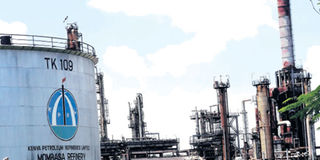Refinery plant to be used a storage facility

The Kenya Petroleum Refineries Limited plant in Mombasa. The closure of KPRL has seen the country rely on imported petroleum products. PHOTO | FILE | NATION MEDIA GROUP
What you need to know:
The country is also in a dire need of a strategic petroleum reserve.
Should something occur curtailing supply of fuel, a crisis can be experienced in the country.
Crude prices are currently averaging $30 a barrel having sharply fallen from the highs attained in June 2014.
The Kenya Petroleum Refineries Limited plant will be converted into a storage facility as the country gears up for commercial oil production, ending debate on the fate of the only oil refinery in the region.
This, Sunday Nation can reveal, is part of recommendations contained in a report by an inter-ministerial committee formed last July to review how best to utilise the idle refinery.
The report will be released this week to the Energy and Petroleum Cabinet Secretary Charles Keter.
The committee comprises members from the Energy and National Treasury ministries and various government departments.
The team was tasked with coming up with a business model and recommendations on how best to put the refinery into good use.
On Wednesday, Mr Keter told the Sunday Nation that the government “is considering converting the refinery into an oil storage facility ahead of commencement of production of the country’s first oil”.
STRATEGIC RESERVE
The country is also in a dire need of a strategic petroleum reserve, with the current storage capacity estimated to last the country only seven days.
This means that should something occur curtailing supply of fuel, a crisis can be experienced in the country which will negatively impact on road and air transport.
“We are fast-tracking the issues concerning the refinery in the light of the government trying to look into best models in terms of commercialising our oil. One of our key areas is KPRL and we’ve had a meeting with them and soon you’ll hear from government,” said Mr Keter.
The government had initially set September as the date when the first crude out of Kenyan ground will be shipped to international markets.
The first oil project is to be implemented using road and rail networks, initially producing 2,000 barrels per day before graduating to 10,000 barrels per day.
However, this plan appears to have been pushed to next year as government and oil exploration companies read from different scripts.
TULLOW OIL DECISION
In a recent update, Tullow Oil, which together with its partner Africa Oil Corporation is responsible for most of the crude discoveries in the country said that it would make a final investment decision (FID) on the Kenyan project in 2017.
FID informs whether a company will or will not invest in a production.
It is arrived at after evaluation of several variables such as the global price of crude oil and future prospects, the amount of resource discovered and the cost of setting up the necessary infrastructure such as a pipeline.
Crude prices are currently averaging $30 a barrel having sharply fallen from the highs attained in June 2014.
The drop is expected to continue this year with additional production from Iran but may reverse if ongoing negotiations between members of the Organisation of Petroleum Exporting Countries result in agreement to effect supply quotas.
Tullow said in its latest update that it can only break even producing oil at a cost of $25 a barrel.
KPRL shut down operations in September 2013 following a disagreement between the government and India’s Essar Energy who were the two main shareholders.
Cabinet has since approved a $5 million payout to Essar to pave way for revival of operations at the Mombasa-based facility, either wholly owned by government or through a joint venture.
The closure of KPRL has seen the country rely purely on imported petroleum products, whose price comprises the cost of refining crude, thus denying local consumers the benefits of low fuel prices at the pump.
Mr Keter said the government is keen on having Kenya Pipeline Company (KPC) take over management of the refinery.
KPC is primarily tasked with ensuring adequate storage for petroleum products and seamless supply system.
“We are streamlining the pipeline. We want the business environment in Kenya to be very competitive and transparent. That is the bottom line,” said Mr Keter on the sidelines of a workshop held on Wednesday for oil and gas exploration companies organised by the ministry.





